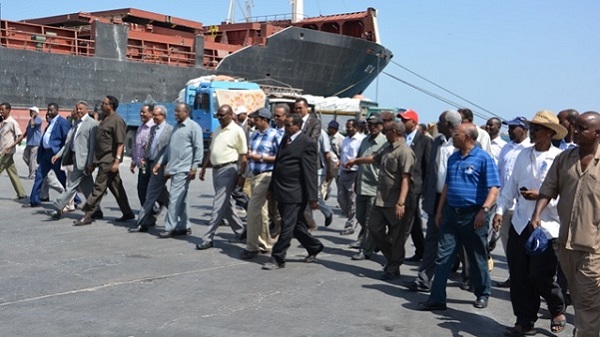
Ethiopia is planning to diversify its seaward and inland transport, through the ports of other neighbors (Sudan and Somaliland), which could cut payments to Djibouti.
By Nizar Manek (The Hindu)
Ethiopia’s “umbilical cord”, Djibouti, could soon feel the pinch. After Ethiopia lost its lifeline to the Red Sea following the independence of Eritrea a quarter century ago, Djibouti has been land-locked Ethiopia’s gateway to the outside world. The International Monetary Fund (IMF) ranks Ethiopia as Africa’s fastest-growing economy, and its ruling Ethiopian People’s Revolutionary Democratic Front (EPRDF), in power since the loss of the Eritrean ports of Assab and Massawa, prioritizes export-led industrial growth. It depends on Djibouti, which channels 95% of its cargo and does most of the staffing for Ethiopian export containers.
However, Ethiopia is now planning to diversify its seaward and inland transport, which could cut payments to Djibouti. Up to 80% of Ethiopia’s cargoes could be diverted through the ports of other neighbors, Sudan and Somaliland, once fully operational for Ethiopian use, Roba Megerssa Akawak, CEO of Ethiopian Shipping & Logistics Service Enterprise (ESLSE), told this reporter.
The state monopoly also plans to cut transit time and congestion — sometimes of months — at Djiboutian ports by half and save on scarce foreign currency by developing its own cargo transit service through two new inland dry ports and a staffing service for containerized cargo. China Civil Engineering Construction Corp. is expected to finish expanding the inland ports by early next year, and these ports would be linked to Djibouti by a new Chinese-built railway, Mr. Roba said. “Middlemen always advocate” export commodities be packed in Djibouti as opposed to in Ethiopia, he said. The government has a plan to provide services from one of the new inland ports to Somaliland’s Berbera Port. “When we faced congestion in Djibouti, we alternatively used Port Berbera and Port Sudan,” Mr. Roba said. “The plan is to expand these operations.”
Read the complete story at The Hindu
——
See also:
- Ethiopia Plans to Increase FDI by 10 Folds: Official
- Ethiopia to Sell Shares of Ethiopian Shipping Lines
- Ethiopia Eyes Role in DP World-Managed Berbara Port
- VIDEO: What Propelled Ethiopia to Overtake Kenya as East Africa’s Economic Giant
- Abu Dhabi-based ADNOC Distribution to Sell Engine Oil and Lubricants in Ethiopia and Yemen
